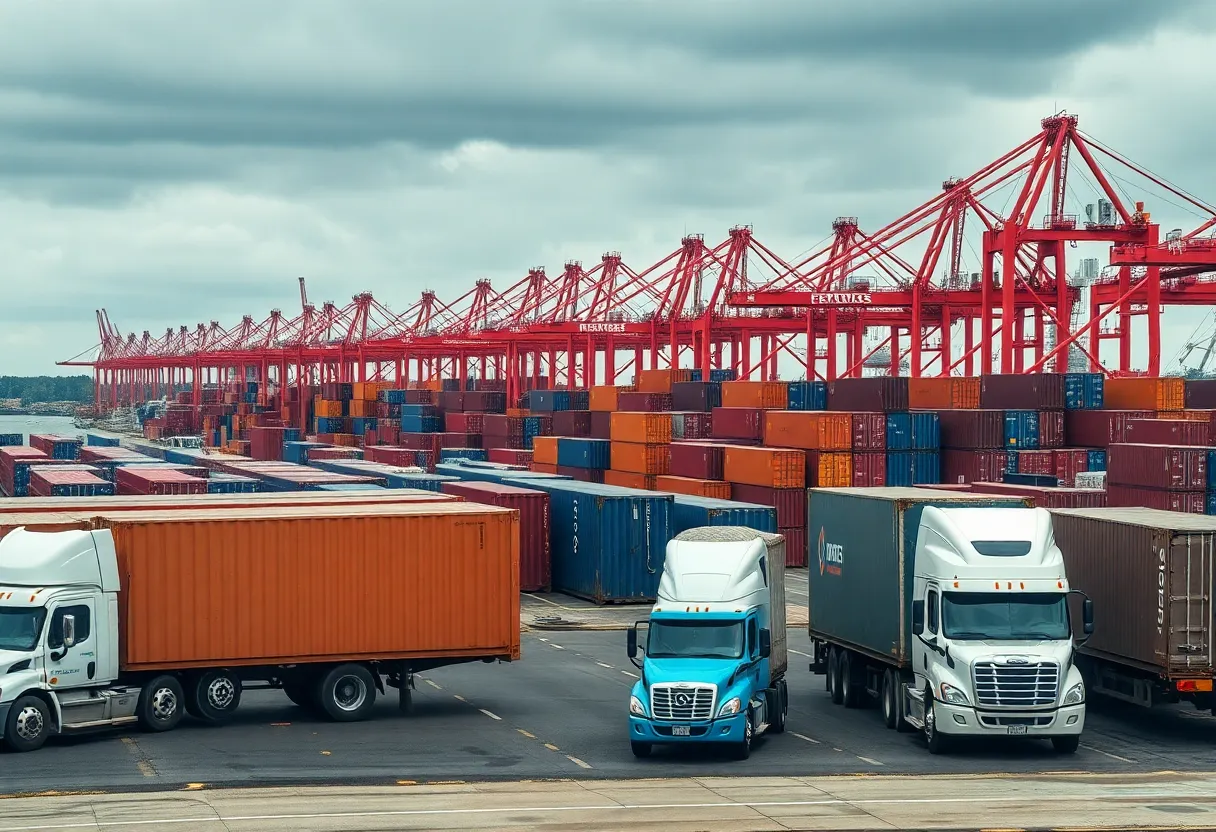News Summary
As the trade war escalates under President Trump’s tariffs, Georgia’s economic landscape is increasingly fragile. The trucking industry shows early signs of distress, with significant tariffs impacting supply chains. Experts warn of a potential decline in trucking demand and subsequent layoffs, while consumer confidence falls. The Georgia Ports Authority is also preparing for a reduction in shipping traffic, complicating the economic outlook further.
Atlanta, Georgia – The economic landscape in Georgia is beginning to show signs of fragility as a result of the escalating trade war initiated by President Donald Trump, marked by significant tariffs and trade restrictions. With global shipping slowing and the trucking industry facing early indicators of distress, companies across the state are bracing for potential disruptions.
Since April 5, the U.S. has implemented a 10% tariff on all imports and instituted a steep minimum 145% duty on various Chinese goods. Furthermore, tariffs on foreign automobiles are set at 25%, although certain auto parts tariffs have recently been relaxed. These actions, combined with ongoing tariffs on Canadian and Mexican imports, are contributing to a complicated economic environment that poses risks to supply chains.
Seth Millican, president and CEO of the Georgia Motor Trucking Association, has indicated that trucking industry members may soon encounter increasing pressures within a two to three-week timeframe. Approximately 75% of Georgia’s communities depend entirely on trucking for the delivery of essential goods, making the stakes particularly high.
Since disparities from the trade war began, many maritime shipping companies have halted or canceled shipments altogether. Industry data reveals a noted rise in canceled sailings beginning May 5, with economists from Apollo Global Management projecting a potential drop in national trucking demand as soon as mid to late May. This forecast includes anticipated layoffs within the trucking and retail sectors as work slows down.
The broader implications of the ongoing trade war are also evident in consumer behavior. Current consumer confidence nationwide is at a record low, with notable declines in tourism and businesses stockpiling inventory to avoid tariff repercussions. Should the conflict persist, experts warn of possible shortages in essential goods.
The pressures facing the trucking industry are leading members to make tough decisions, either to raise costs or reduce services, with some even contemplating closing their businesses entirely. The Georgia Ports Authority recorded a busy April, averaging over 30 container vessel visits per week, but expectations indicate that cargo traffic may “moderate” in May, leaving uncertainty regarding the extent of the reductions.
As a precautionary measure, workers at Savannah docks are preparing for a potential reduction in labor hours within two weeks as shipping visits diminish. Fortunately, Savannah’s port has diversified its sources, reducing its dependence on Chinese goods from 49% in 2018 down to 33%, providing some level of protection against the ongoing trade issues.
Both the Georgia Ports Authority and its users have been strategizing various scenarios regarding potential future disruptions, keeping in mind the ongoing volatility in tariff policies. UPS has reported a drop in domestic parcel volume and has suspended financial projections due to the unpredictability of the economic climate. Meanwhile, the CEO of Norfolk Southern noted stable domestic volumes though uncertainty persists about future logistics. In contrast, CSX rail has seen an uptick in shipping container deliveries, attributed to preemptive inventory purchases by companies attempting to cushion against potential tariff impacts.
Despite challenges in the trucking industry related to driver shortages and rising insurance costs, there is a possibility for producers of non-traded goods and services in the United States to see a sales opportunity due to the deficiencies in traded goods. Additionally, the Georgia Department of Transportation anticipates that freight volumes will double over the next 25 years, adding another layer of complexity to the existing challenges.
While cargo held up at Georgia Ports Authority terminals will avoid tariffs until cleared through customs, this could lead to issues with storage spaces as imported goods accumulate. The complexities presented by the evolving economic landscape call for resilience and adaptability within Georgia’s trucking sector. However, continued volatility in tariff policies will likely impede long-term business planning for Georgia companies as they navigate through this uncertain terrain.
Deeper Dive: News & Info About This Topic
- Saporta Report: Kemp Spurns Senate Race
- Washington Post: Trump Presidency News
- Albany Herald: Southwest Georgia Businesses and Tariff Changes
- AJC: Georgia CEOs Unsure on Trade War Impact
- Atlanta News First: Georgia Chamber Report on Trade War
- Wikipedia: Trade War
- Google Search: Trade War Impact on Business
- Google Scholar: Trade War Economics
- Encyclopedia Britannica: Trade War
- Google News: Trade War News

Author: STAFF HERE AUGUSTA WRITER
The AUGUSTA STAFF WRITER represents the experienced team at HEREAugusta.com, your go-to source for actionable local news and information in Augusta, Richmond County, and beyond. Specializing in "news you can use," we cover essential topics like product reviews for personal and business needs, local business directories, politics, real estate trends, neighborhood insights, and state news affecting the area—with deep expertise drawn from years of dedicated reporting and strong community input, including local press releases and business updates. We deliver top reporting on high-value events such as Arts in the Heart Festival, Westobou Festival, and Masters Week. Our coverage extends to key organizations like the Augusta Metro Chamber of Commerce and Greater Augusta Arts Council, plus leading businesses in manufacturing and healthcare that power the local economy such as Textron Specialized Vehicles, Cardinal Health, and Nutrien. As part of the broader HERE network, including HEREAtlanta.com and HERESavannah.com, we provide comprehensive, credible insights into Georgia's dynamic landscape.


